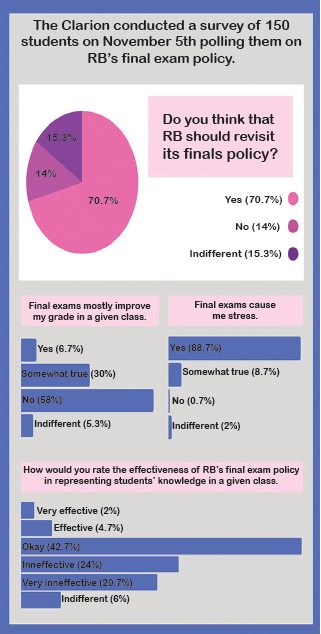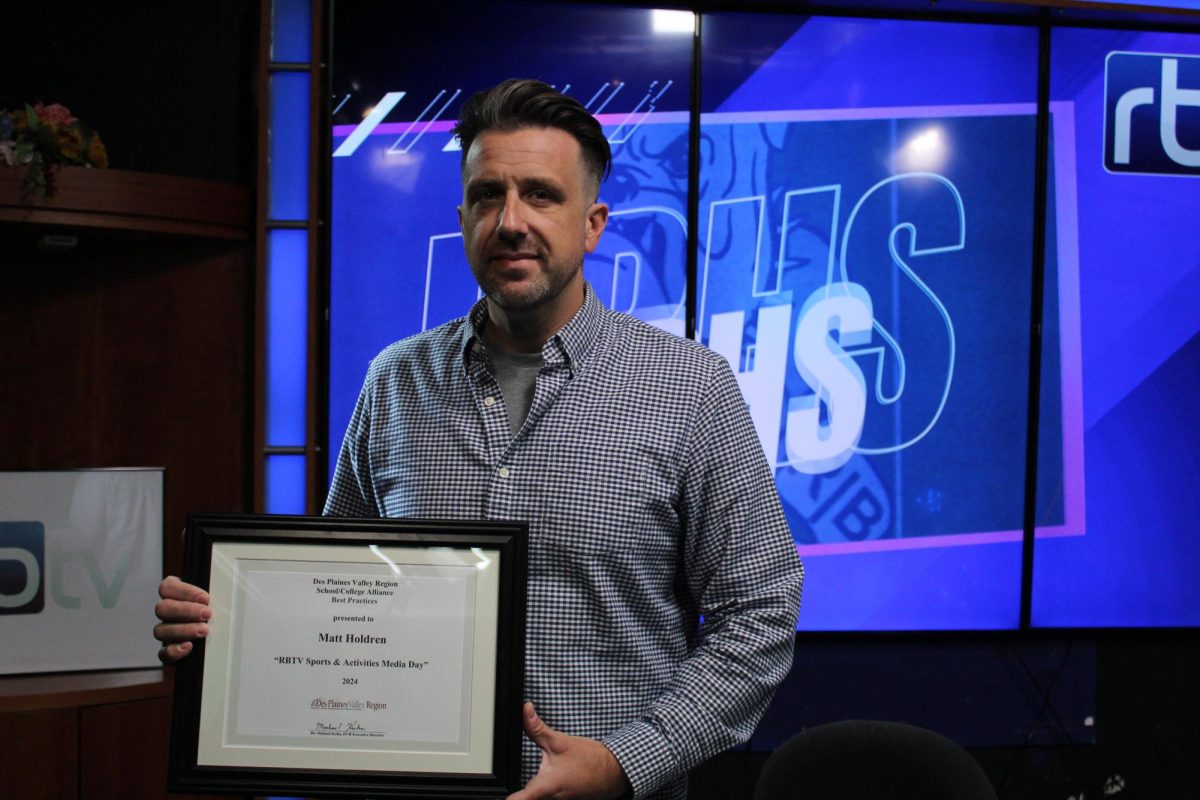Editors note: This article was previously published in volume 91, issue 1 of the Clarion hardcopy.
As the end of first semester comes to a close, final exam season approaches. This inherent part of RB’s instructional process has sparked a conversation between students and staff. The outlook on finals spans a wide range.
“The first thing that pops into my head is long exams. Obviously my opinion is not very positive just because it’s dreadful,” junior Julianna Puleo said.
While some students find finals to be a negative experience, junior Maria Dalton approaches them as a requisite of the classroom experience.
“My overall opinion on finals is that I feel indifferent because I don’t hate them, but I don’t love them either… I’m not against them,” Dalton said.
RB’s final exam policy requires all courses to give an end of the semester summative assessment. Depending on the subject area, how teachers evaluate students’ knowledge varies. According to the Riverside Brookfield 2022-2023 Student Handbook, “These assessments may include, but are not limited to, essay tests, objective tests, portfolios, skill tests, and exhibitions.”
Math teacher Melissa Gordon teaches AP Calculus BC, Honors Geometry, and Algebra. Gordon’s exams include a majority of multiple choice with some free response questions.
“It’s definitely a good representation of what they understand since it is all skills with the math questions. Is it necessarily what they’re capable of? Not always. I feel as though many students could spend more time preparing but it does show me what they can do at that time,” Gordon said.
Recently, social studies teacher Kevin Turk has reflected on his style of assessment. Turk believes that, for his students, a multiple choice format is not the best way to evaluate his students’ skills.
“I’m kind of in this space right now where I don’t know if I like the old way of doing things, but I think there are ways to measure skills without it just being a test kids memorize questions for,” Turk said.
Turk has experimented with his testing format in the past, including verbal assessments to try and benefit students whose strong-suit is not a traditional test design. However, Turk sees the potential flaws in this method of testing, realizing there may not be a perfect strategy that caters towards all students’ strengths.
“I also understand that not every kid is good at that. Some get really anxious having that type of format,” Turk said.
For most students, whether it be final exams or any form of assessment, test anxiety comes with it. World language teacher Jill McGrath’s main concerns with finals pertains to the stress it causes for her students.
“If somehow we can get the message across to students to really look at your classes and focus your attention where it needs to be focused,” McGrath said. “I think one thing that is hard for me is certain students get really really stressed out.”
Senior Jack Stille opens up about his form of test anxiety.
“I don’t get too stressed about studying or anything until I am in the room,” Stille said. “It’s more so the pressure knowing that it’s important. It’s a big chunk of the grade.”
According to Scott Eggerding, Lyons Township High School’s Director of Curriculum and Instruction, for students at LT, their final exam is not worth more than any test in the semester. At RB, the exam is worth 20 percent of a student’s overall semester grade in a given class.
“I think the fact that the finals are worth the same as any test seems the most interesting to me. I feel like that’s a really fair way of doing things and I could see that working for RB because students would stress less about finals, and if they don’t do as great on the final, their grade won’t be affected as much,” Puleo said.
Similarly to RB, LT has four categories of semester exams: cumulative, summative, or final project/performance. Additionally, some courses given at LT do not have a final exam, but use this time as a chance for students to reflect and better their understanding in class.
“Personally I think the policy they have is interesting. Especially about classes that don’t have any final exams associated with them,” Stille said.
According to Morton West High School’s Assistant Principal of Instruction, Amanda Torres, Morton West has implemented a “Final Exam Incentive.” This incentive allows students to opt out of a course exam if they have maintained a 4.0 or higher GPA in a class, and have a 90 percent attendance record in that given class. This is regardless of grade level. At RB, the current policy states that exam exemptions are for senior students only.
“I think being able to opt out if you have a high GPA and good attendance, even if you’re not a senior, is a really good idea. I feel like RB could do something like that and it could help students that are good at class work but get stressed out by big tests,” Puleo said.
Nevertheless, at RB there is emphasis on maintaining high academic standards and preparing for life after high school. Gordon feels strongly that it is necessary for students to experience some kind of final exam in order to create habits that will help them in their future.
“Part of college is going to be having to take exams over large amounts of material, including semester exams or completing large projects for classes that are more project/performance based,” Gordon said. “Even students going into the trades may need to take certification exams over large amounts of material. Therefore, I feel as though the majority of classes should give a final exam so that students can learn how to study and prepare for an exam of such a large magnitude. With that being said, it may not have to carry as large of a weight as 20 percent of the semester grade.”
While post-RB plans that include major tests are inescapable for the majority of students, there are many lenses to view this inevitable feat through.
“I do understand that you want to prepare students if they’re going to go onto a four year university and that it’s a good thing to experience in high school, but I think education is changing so we should look at different things now,” McGrath said.
Even so, exemptions from finals act as an incentive for many senior students, and could work similarly for juniors and underclassmen.
“If you have an ‘A’ average regardless if you are a freshman, sophomore, junior, or senior, I think that should be a way you don’t have to take final exams. But maybe that is a different discussion,” Turk said.
There is no doubt that there needs to be some form of closure to tie off the end of a semester’s academic endeavors, but how that is done is the main point of debate. Taking other final exam models into consideration, and student and staff thoughts into account, can aid in creating a more productive and effective final exam testing process.
“I kind of go back and forth on how I want to give finals. Ultimately, I believe there should be some form of closure for a semester. How that looks, I am not entirely sure,” Turk said.








